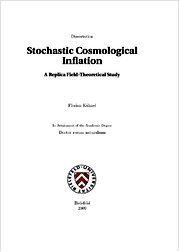Stochastic cosmological inflation
a replica field-theoretical study
Kühnel, Florian
Univ. Bielefeld
Monografie
Verlagsversion
Englisch
Kühnel, Florian, 2009: Stochastic cosmological inflation - a replica field-theoretical study. Univ. Bielefeld, 132 S., DOI: 10.23689/FIDGEO-11.
 |
Dokument öffnen: |
In this thesis we apply methods from statistical physics to stochastic inflation. Those methods, the replica field theory and the Gaussian variational methods, have to our knowledge never been applied before in this context, and allow us to compute the power spectrum of a scalar test field in the most general set-up. It provides a framework to perform calculations in regions of arbitrarily large quantum fluctuations and may also serve as a starting point to address the issue of back reaction. We first give an introduction to cosmological inflation, cosmological perturbation theory and cosmic microwave background anisotropies. Then we explain the idea of stochastic inflation, including some detailed derivations, and give an overview over major progress in this field. This is followed by an introduction to replica field theory, presented in a way directly applicable to stochastic inflation. Our work continues with a detailed calculation of the power spectrum of a scalar test field in a Friedmann Universe. We show the effect of the quantum fluctuations on the spectrum and derive explicit expressions showing its dependence on time and other important parameters. The effect of self-interactions and possible effects on the cosmic microwave background are discussed. We conclude with a summary of our results and give an outlook. One part of our major results has been published in Phys. Rev. D 78, 103501 (2008), where for the first time we present a replica field-theoretical approach to stochastic inflation in which we find a manifestation of the phenomena of so-called dimensional reduction. It implies under certain conditions inevitable infra-red divergencies of correlation functions on large-scales. These conditions are examined in detail in Phys. Rev. D 79, 44009 (2009), where we find that generically for a wide class of circumstances the divergencies are pushed exponentially fast well beyond observable scales ...

